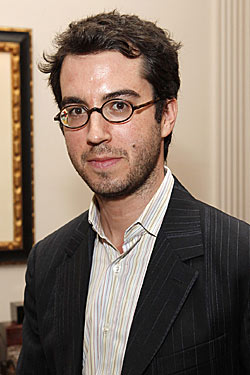
The Observer reported today that The New Yorker, in its June 7 fiction issue, will begin publishing work from the twenty American writers under the age of 40 that it believes are the “key writers of this generation.” Since it is hard to imagine a more highbrow list than this particular “20 under 40” (not to be confused with the 30 under 30, or even the 25 under 20), we feel it is our populist duty to point out the similarities it seems to share with American Idol. (Plus, mash-ups of American Idol and literature are a thing around here.)
1. The judging is way harsh. New Yorker fiction editor Deborah Treisman required a “piece of new, unpublished work” from all candidates. Those in consideration who could not provide one, or write one for the occasion, were disqualified. Like Idol, she also observed a strict age cutoff, meaning a 41-year old like Dave Eggers will have to wait for the “20 under 50.”
2. Appearing on this list/show can make you (relatively) famous. Okay, so maybe it’s not like winning an Oscar, but one agent told the Observer, “It just kind of opens doors in a big way. Professionally, for an author, it means you can do things like go to Yaddo anytime you want. It makes it easier for you to sell your work abroad. It makes it easier for you to get teaching jobs or fellowships, or grants if you’re applying for the NEA or the Guggenheim. All of that stuff really matters.”
3. Everyone will always talk about how the previous cast was better. The New Yorker put together a “20 under 40” in 1999 that the new crew will have a hard time living up to, what with the previous group including David Foster Wallace, William Vollman, Nathan Englander, Jhumpa Lahiri, Jonathan Franzen, Jeffery Eugenides, Michael Chabon, Junot Díaz, Edwidge Danticat, and many other authors you have heard of. (That issue of The New Yorker can be found here). Additionally, in 2007, Granta published a “Best of Young American Novelists” list that will likely overlap somewhat with The New Yorker’s. (Jonathan Safran Foer, for example, whose picture, though not name, appeared with the Observer article, was on the Granta list.)
4. There will be unknown talents. “What I hope an exercise like this does,” New Yorker editor David Remnick told the Observer, “in addition to pushing that much more forward names that are obvious or semi-obvious, is [introduce] people who have had minimal exposure, maybe have had one story here and maybe didn’t, but that the fiction department in particular — and I along with them — really want to put in front of you.”
So, there you have it: ultrahighbrow literary list, not entirely unlike American Idol.
America’s Next Top Novel [NYO]

